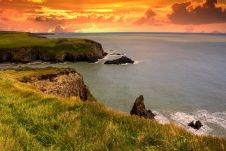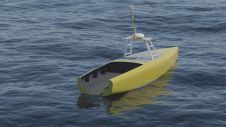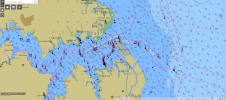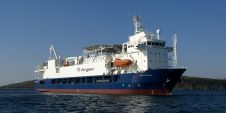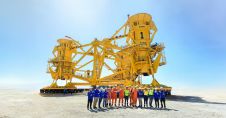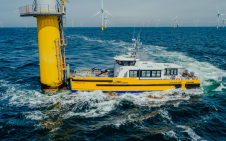Hydrographic Society Benelux
Workshop on Coastal Zone Management
Friday 14 December 2007, the traditional Chrismas workshop of the Hydrographic Society Benelux (web reference 1) was held in The Hague. The theme of the workshop was Coastal Zone Management (CZM) and the venue at the National Institute for Coastal and Marine Management (part of Rijkswaterstaat (web reference 2) was very appropriate. Since the institute is recently merged into the Centre for Water Management, for most attendees it was also a goodbye to this institute. The workshop was very well attended (over 60 people).
The Netherlands and Belgium have a sandy coast and the term sand management for CZM is equally valid. In the workshop before the break, two basics for CZM were presented: knowledge of coastal processes and the operational process of the maintenance itself.?Ipo Ritsema presented the new institute Deltares (web reference 3) for knowledge and research on living and working in river deltas. Deltares was formed in 2007 as a merge of the institutes GeoDelft and Delft Hydraulics and parts of TNO and Rijkswaterstaat. Deltares also has major international projects in e.g. the Mississippi delta near New Orleans and in Dubai.
The maintenance of the coast line is performed by dumping sand on the coast. For the Netherlands every year about 12 Mm3of sand is needed. the locations for dumping and the amount of sand is determined by analysis of the yearly hydrographic monitoring programme. Willem Van der Lee of Rijkswaterstaat presented this programme and the need for consistent measurements over the years.
After the break the link between knowledge and operations was made by three presentations on specific projects.
Sicco Kamminga, director of Qmetrix (web reference 4), presented some insight in the measurements of waves. Knowledge on waves is used in dimensioning and evaluating water barriers like dikes and dunes. Waves are traditionally measured by buoys and beacons, but introduction of systems like the acoustic Doppler currentprofilers open new opportunitiesfor measurements on difficultlocations and in a new frequencyrange. Sicco also talked about the development of a simple device for monitoring the status of a submerged measurement instrument.
In the project Ecobeach (web reference 5), presented by Kees Van Ruiten of Deltares, a novel approach isinvestigated for beach maintenance. Using special tubes the permeability of the sand on the beach is changed and it is being investigated whether more sand can be held on the beach and in the dunes. This approach is not undisputed, but it is hoped that the 3-year project Ecobeach will give more insight in the dynamics of the beach. Also the project is an example of a fruitful cooperation of a government agency (Rijkswaterstaat), a knowledge institute (Deltares) and a private company (BAM).
The last presentation was given by Sjaak Jacobse of Royal Haskoning on the concept of a coastal reef near the Dutch shore. As mentioned before, the Dutch coast is a sand coast and sand dynamics is very important. At some points the standard maintenance is not sufficient because of building on the coast or solid barriers. Erosion is in these cases an immediate hazard for the coast safety. A coastal reef can in those cases reduce the wave energy and change the currents. In this way the risk could be reduced as indicated by the model study, that Sjaak presented.
After these very interesting presentations Chrismas drinks were served in the ‘Zoutterrain’, the bar of the cellar of the institute. There the discussions, started during the meeting, were continued.

Value staying current with hydrography?
Stay on the map with our expertly curated newsletters.
We provide educational insights, industry updates, and inspiring stories from the world of hydrography to help you learn, grow, and navigate your field with confidence. Don't miss out - subscribe today and ensure you're always informed, educated, and inspired by the latest in hydrographic technology and research.
Choose your newsletter(s)


